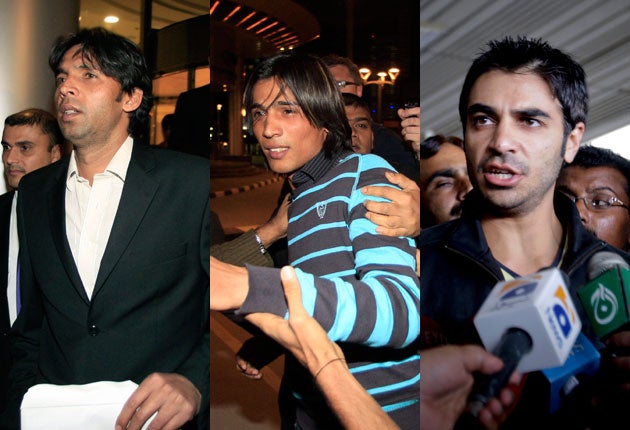James Lawton: Banishment of brilliant young hope Amir is the greatest scandal of all
The ICC put three cricketers in the dock but you have to ask the whereabouts of the people who were in charge of Amir's well-being

Cricket's ruling body seems to believe it has achieved both closure and a measure of justice with the decision to hand out bans, all effectively for five years, to Salman Butt, Mohammad Asif and Mohammad Amir. Closure? Justice? Who on earth is kidding whom?
Butt was the captain of a team said to be easily compromised and diverted by betting interests. Asif was of mature age but with a deeply problematic, controversy-strewn past which included a ban for illegal drug use. Amir was a boy. But now they are thrown into the same sack and tossed away.
No doubt if and when all three Pakistani cricketers appear in an English courtroom to answer criminal charges we will get a rather more forensic examination of their relative guilt or innocence, and, if the former is the case, a more appropriate level of punishment.
In the meantime, however, it is necessary to see that the real issue is so much wider, and crucial to the game's credibility, and because of this we can only shake our heads at the declaration of the International Cricket Council's chief executive Haroon Lorgat.
He says: "We've demonstrated that we will do everything that we need to do to ensure that the sport is free of corruption." This is a pretty thought for cricket to take into the upcoming World Cup but it scarcely bears a moment's examination.
The deepest horror of the whole episode is the one that has hardly been brushed by the bans which, realistically, have ended the international careers of the older players, Butt and Asif, and which banish the brilliant teenager Amir until he is 23 years old.
It is the alleged corrupting of Amir even as he took his first steps towards what even the most conservative judges of outstanding talent rated as potentially one of the greatest of careers.
The ICC put three cricketers in the dock but you have to ask the whereabouts of the people who were in charge of Amir's well-being, the Pakistani officials who left their team quarters open to the forays of a man charged with setting up irrefutable evidence that he could, for an agreed fee, engineer corrupt behaviour on the field?
No one was saying that if proven guilty Amir should escape any form of punishment, only that there should be an understanding of his quite grotesquely vulnerable position.
The lightly educated product of a poor Punjabi village, Amir brought little knowledge of the world and still less of the amounts of money he was told were available not to throw a match but merely add a couple of entries to the extras total. The case against Amir is that he bowled two pre-ordained no-balls among a stream of superb deliveries.
It if is true, as the ICC decided, of course he was wrong but, against the background of all we know about the culture of Pakistani cricket, the long-term laxity in the face of corruption, sufficiently so to be cast into the wilderness for five years?
Freddie Flintoff, whose heroic performances for England pushed him into an income group beyond the dreams of any of his Pakistani contemporaries, believes so. He argues fervently for zero tolerance. He may be right when he says that he carries with him an overwhelming majority of the cricket public. However, there are times when mere rectitude leaves us some way short of a just solution.
Making Amir a sacrifice might make a lot of people feel better. But then maybe they are a little too easily, and a little too cruelly, pleased.
Join our commenting forum
Join thought-provoking conversations, follow other Independent readers and see their replies
Comments
Bookmark popover
Removed from bookmarks